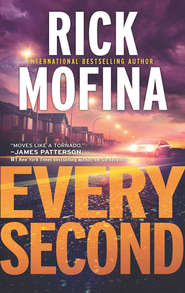По всем вопросам обращайтесь на: info@litportal.ru
(©) 2003-2025.
✖
Six Seconds
Автор
Год написания книги
2018
Настройки чтения
Размер шрифта
Высота строк
Поля
“One last thing,” Carmen said. “Every now and then, the computer guy would turn his laptop to the stranger so he could read the screen.”
Graham didn’t know what he had.
Driving back to Calgary, he weighed the new information. The Tree Top was about a forty-five-minute drive from the Tarvers’ campsite. The photo put Ray in the restaurant the day before his family was found in the river.
Who was the guy at his table?
And why was Ray showing him his laptop? Was it an arranged meeting? Or spontaneous? Maybe he’d gone there to interview someone for a travel article?
Maybe it was nothing?
But some twenty-four hours later, his family was dead.
Now, Ray was missing and so was his laptop.
The questions gnawed at Graham as he worked alone at his desk.
Since the initial front-page stories, the calls from the public had slowed. Prell and Shane had followed up with a lot of door-knocking. Most of the information was useless, even bizarre. One guy claimed that the Tarvers had been “abducted by alien organ harvesters who will appear at the UN.”
Other tips were more down-to-earth, like the local rancher who’d insisted he’d seen a man resembling Ray hitch a ride on a logging rig. Graham had contacted all the lumber and trucking companies in the region.
No one had picked up anybody.
And nothing had surfaced concerning the whereabouts of Ray’s missing laptop.
The Banff and Canmore Mounties had put the word out to see if anyone on the street was selling one like Ray’s. Graham notified Calgary and Edmonton city police, who circulated information to pawnshops.
Jackson Tarver agreed to release the family’s bank, credit and Internet accounts. If someone had stolen Ray’s laptop they may be using it, and this information could help track the computer down.
Nothing had surfaced so far.
What was he missing?
Graham’s cell phone rang.
“Danny, it’s Horst at the site.” Static hissed over the search master’s satellite phone, mixing with the river’s rush and a distant helicopter.
“You find anything?”
“Nothing. Our people have been going full tilt for twenty-four-seven for the past few days. We figure he likely got wedged in the rocks, or a grizz hauled him off. A couple of big sows have been spotted in the search zones. We could find him in the next hour, or the next month, or never. Know what I mean?”
“Right.”
“We’ll keep it going, but we’ll wind it down by the end of the week.”
It was early afternoon as Graham ate his lunch, alone, outside at a picnic table.
He chewed on the ham and Swiss he’d made at home, looked at Calgary’s office towers and the distant Rockies and tried not to think of his life.
Stay on the case, he told himself.
He was nearly finished his sandwich when the superintendent’s assistant, who spent her lunch breaks walking in the neighborhood, approached him.
“There you are. How you keeping, Dan?”
“Day by day, Muriel.”
“There’s going to be a barbecue with Calgary city vice unit at Lake Sundance this weekend.”
“I heard.”
“Come join us, if you’re up for it.” She touched his shoulder.
“Thank you. We’ll see.”
“Sunday. Around three. Don’t bring a thing, dear.”
Graham nodded.
But when Muriel left, he decided he was not up to it. He crumpled his lunch bag and tossed it in the trash. Back at his desk, he went at the file again.
At Graham’s request, Ray’s father had faxed him copies of the insurance policies Ray had taken out on himself and his wife. Each had a two-hundred-fifty-thousand-dollar death benefit. Anita was Ray’s beneficiary, Ray was hers. If they both died then Ray’s parents became beneficiaries.
Those were big numbers. People had committed serious crimes for less, but Graham saw no reason to suspect an insurance fraud, unless Ray Tarver emerged from the mountains unharmed to collect a quarter of a million dollars.
Graham returned to the Tokyo photo. He had to be missing something, he thought, staring long and hard at Ray and his laptop, until the light began to fade. With most of day and most of his coworkers gone, Graham began to dread what was coming.
13
Blue Rose Creek, California
After repeated attempts, a woman finally answered Maggie’s call to Madame Fatima.
She listened to Maggie’s request and told her to call back the next day, which Maggie did.
“Madame says not today. Call tomorrow.”
“If I could just come and talk to her, please.”
“She has little time to help. Call tomorrow.”
“Please, I need to see her. Please. I beg you.”
Maggie heard a second voice in the background then a hand covered the mouthpiece muffling a conversation between two people at the other end of the line. Then the woman said, “Madame says you may call back this afternoon, around three.”
Maggie thanked her and, with spirits lifted, resumed work at the bookstore.
She restocked shelves and was taking care of orders when a customer jingled her keys to get her attention before thrusting a napkin at her with a title scrawled on it. The woman reeked of cigarettes.











